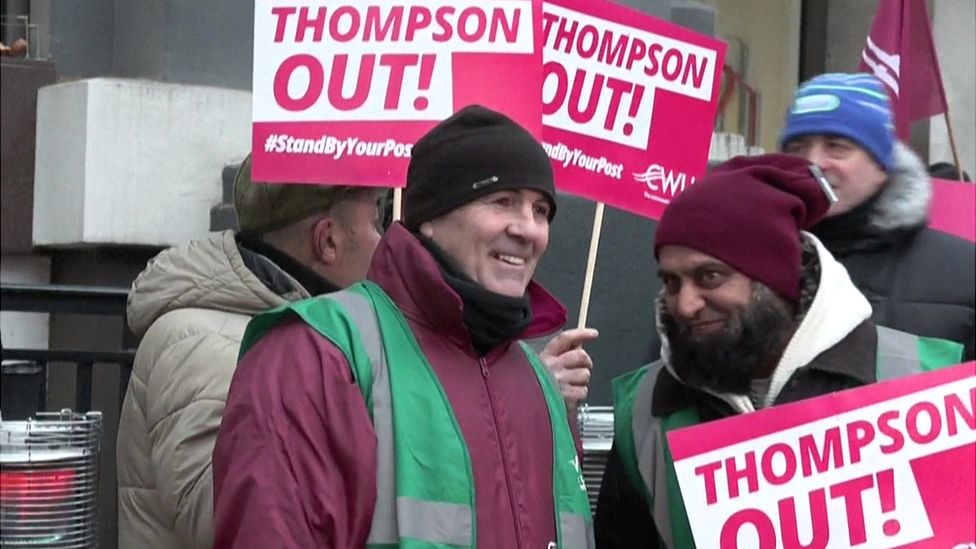ARTICLE AD BOX

Royal Mail workers at Mount Pleasant Mail Centre joined thousands of striking CWU members
By Dearbail Jordan
Business reporter, BBC News, Mount Pleasant
By the second week of December, Royal Mail's sorting office in central London should be one of the busiest places on earth.
With the festive season fast approaching, 1.3 million letters and parcels would normally be tumbling through Mount Pleasant Mail Centre each day - with some, perhaps, on their way to underneath a Christmas tree.
On Friday, however, Royal Mail's cavernous sorting centre is deserted.
Instead of the 1,000 people usually found bustling around the company's biggest site, just 100 workers have turned up.
The rest are out on strike for the 13th day of industrial action by CWU union members since the beginning of the year - and there are five more days to come.
One of those who has chosen to work is Joy, a Royal Mail veteran of 28 years, who is feeding armfuls of letters into a vast, automated sorting machine.
Image source, BBC
Image caption,Royal Mail employs agency workers during the peak Christmas season
For Joy, who is a manager at the plant, it is important "to keep moving the mail" even if it doesn't leave the centre until striking posties return to work.
Firms are worried about business following Covid, he tells the BBC. "They need their letters and their mail ASAP."
Outside in the cold, Nick is one of the 115,000 Royal Mail workers across the UK who are taking industrial action.
Like Joy, he has worked for the company for decades, but a dispute over pay, looming redundancies and what Nick believes are unfair changes to working conditions mean that strike action is the only option for him.
Although he has walked out during previous strikes in years gone by, he says that the gulf between management and unions appears to be wider this time around.
"It seems to me there's not really a negotiation," he says. "It is a take it or leave it deal where they are attacking our terms and conditions."
Both Joy and Nick were happy to be interviewed, but did not wish to give their last names or be pictured. Industrial action can stir up strong reactions, whichever side of the picket line you are on.
Despite their differences though, both men are proud to work for an institution that has been around for more than 500 years.
"It is a good job and you have a bit of pride," says Nick. "You're servicing customers and you do feel like you're valued."
The industrial action taken by Royal Mail workers also appears to be curiously genteel, especially compared to the violence that sometimes marked the miners' strikes of the early 1980s.
By contrast, the early morning gathering of strikers outside Mount Pleasant might be loudly chanting "Thompson out" in reference to Royal Mail chief executive Simon Thompson, but they respect the rights of people to work during industrial action.
"If people want to come to work, they come to work," says Nick. "People go in, we don't say a word to them. We're here fighting for everybody."
But Jay Brooks, Royal Mail's plant manager at Mount Pleasant, believes it is difficult for some people who choose to break the picket line.
Jay Brooks is the plant manager at Royal Mail's Mount Pleasant sorting centre
Instead of working at their own office on a strike day, they will volunteer to travel to another site to help process the mail, where they join agency workers who are employed by Royal Mail at this busy time of the year, he says.
"I think that there are some people who are concerned about crossing a picket line in terms of what that will mean for their relationships with other people within their offices, which is probably why we sometimes see people prefer to go to a neighbouring office," says Brooks.
"It is obviously a personal choice. We will say to people on site it is their own personal decision if they plan to come to work or not. We have to respect that either way."
For now, there are five more strike dates to come,on 11, 14, 15, 23 and 24 December.
As a result, people and businesses have had to post earlier this year, likely leading to frustration for some.
"I completely sympathise and I completely understand people's frustrations with this," says Brooks. "Ultimately, we all want this dispute to come to an end. From my perspective I want to be excited about the future of Royal Mail."

 2 years ago
40
2 years ago
40








 English (US) ·
English (US) ·